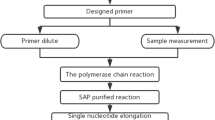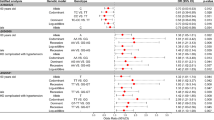Abstract
Background
High levels of circulating heat shock protein 60 (Hsp60) and antibody to human Hsp60 have been associated with greater risk of coronary heart disease (CHD) in several studies, but associations between polymorphisms of the hsp60 gene and CHD risk have not been investigated.
Methods
By resequencing DNA from 30 unrelated Han Chinese and using HapMap Phase I Chinese data of hsp60 gene, we selected four tagging single nucleotide polymorphisms (tagSNPs) named rs2340690, rs788016, rs2305560, and rs2565163, and determined their frequencies in 1,003 Chinese CHD patients and 1,003 age- and sex-frequency-matched controls. Furthermore, we used PHASE 2.0 software to reconstruct haplotypes and logistic regression to control for potential confounders in multivariate analyses.
Results
We found 13 SNPs in hsp60 gene (including four novel SNPs) in Han Chinese subjects. Our results showed no significant differences in four selected SNPs in patients with CHD and controls after adjusting for other conventional risk factors and stratifying by age, sex, smoking status, past history of hypertension and DM; however, our results showed that subjects with the GCTC haplotype had about twofold higher risk of CHD than those with the GTTC haplotype (OR = 1.91, 95%CI: 1.26–2.89, P = 0.002).
Conclusions
Our results suggest that the GCTC haplotype in the hsp60 gene is significantly associated with higher CHD risk in a Chinese population.

Similar content being viewed by others
Abbreviations
- BMI:
-
body mass index
- CHD:
-
coronary heart disease
- CIs:
-
confidence intervals
- FBG:
-
fasting blood glucose
- Hsp60:
-
heat shock protein 60
- LD:
-
linkage disequilibrium
- MAF:
-
minor allele frequency
- ORs:
-
odds ratios
- SNPs:
-
single nucleotide polymorphisms
- TC:
-
total cholesterol
- TG:
-
triglyceride
References
Burian K, Kis Z, Virok D et al (2001) Independent and joint effects of antibodies to human heat-shock protein 60 and Chlamydia pneumoniae infection in the development of coronary atherosclerosis. Circulation 103:1503–1508
Carlson CS, Eberle MA, Rieder MJ, Yi Q, Kruglyak L, Nickerson DA (2004) Selecting a maximally informative set of single-nucleotide polymorphisms for association analyses using linkage disequilibrium. Am J Hum Genet 74:106–120
Couzin J (2006) Genomics. The HapMap gold rush: researchers mine a rich deposit. Science 312:1131
Ding K, Zhang J, Zhou K, Shen Y, Zhang X (2005) htSNPer1.0: software for haplotype block partition and htSNPs selection. BMC Bioinformatics 6:38
Gabriel SB, Schaffner SF, Nguyen H et al (2002) The structure of haplotype blocks in the human genome. Science 296:2225–2229
Hansen JJ, Durr A, Cournu-Rebeix I et al (2002) Hereditary spastic paraplegia SPG13 is associated with a mutation in the gene encoding the mitochondrial chaperonin Hsp60. Am J Hum Genet 70:1328–1332
Hansen JJ, Bross P, Westergaard M et al (2003) Genomic structure of the human mitochondrial chaperonin genes: HSP60 and HSP10 are localised head to head on chromosome 2 separated by a bidirectional promoter. Hum Genet 112:71–77
Hansson GK, Libby P, Schonbeck U, Yan ZQ (2002) Innate and adaptive immunity in the pathogenesis of atherosclerosis. Circ Res 91:281–291
Kleindienst R, Xu Q, Willeit J, Waldenberger FR, Weimann S, Wick G (1993) Immunology of atherosclerosis. Demonstration of heat shock protein 60 expression and T lymphocytes bearing alpha/beta or gamma/delta receptor in human atherosclerotic lesions. Am J Pathol 142:1927–1937
Kol A, Bourcier T, Lichtman AH, Libby P (1999) Chlamydial and human heat shock protein 60s activate human vascular endothelium, smooth muscle cells, and macrophages. J Clin Invest 103:571–577
Kol A, Lichtman AH, Finberg RW, Libby P, Kurt-Jones EA (2000) Cutting edge: heat shock protein (HSP) 60 activates the innate immune response: CD14 is an essential receptor for HSP60 activation of mononuclear cells. J Immunol 164:13–17
Mayr M, Metzler B, Kiechl S, Willeit J, Schett G, Xu Q, Wick G (1999) Endothelial cytotoxicity mediated by serum antibodies to heat shock proteins of Escherichia coli and Chlamydia pneumoniae: immune reactions to heat shock proteins as a possible link between infection and atherosclerosis. Circulation 99:1560–1566
Pockley AG, Wu R, Lemne C, Kiessling R, de Faire U, Frostegard J (2000) Circulating heat shock protein 60 is associated with early cardiovascular disease. Hypertension 36:303–307
Prohaszka Z, Duba J, Lakos G et al (1999) Antibodies against human heat-shock protein (hsp) 60 and mycobacterial hsp65 differ in their antigen specificity and complement-activating ability. Int Immunol 11:1363–1370
Prohaszka Z, Duba J, Horvath L et al (2001) Comparative study on antibodies to human and bacterial 60 kDa heat shock proteins in a large cohort of patients with coronary heart disease and healthy subjects. Eur J Clin Invest 31:285–292
Rahim RA, Boyd PA, Ainslie Patrick WJ, Burdon RH (1996) Human heat shock protein gene polymorphisms and sudden infant death syndrome. Arch Dis Child 75:451–452
Schett G, Xu Q, Amberger A, Van der Zee R, Recheis H, Willeit J, Wick G (1995) Autoantibodies against heat shock protein 60 mediate endothelial cytotoxicity. J Clin Invest 96:2569–2577
Stephens M, Donnelly P (2003) A comparison of bayesian methods for haplotype reconstruction from population genotype data. Am J Hum Genet 73:1162–1169
The International HapMap Consortium (2003) The international HapMap project. Nature 426:789–796
Thomas DC, Stram DO, Conti D, Molitor J, Marjoram P (2003) Bayesian spatial modeling of haplotype associations. Hum Hered 56:32–40
Veres A, Szamosi T, Ablonczy M et al (2002) Complement activating antibodies against the human 60 kDa heat shock protein as a new independent family risk factor of coronary heart disease. Eur J Clin Invest 32:405–410
Wick G, Perschinka H, Millonig G (2001) Atherosclerosis as an autoimmune disease: an update. Trends Immunol 22:665–669
Xu Q, Wick G (1996) The role of heat shock proteins in protection and pathophysiology of the arterial wall. Mol Med Today 2:372–379
Xu Q, Kiechl S, Mayr M et al (1999) Association of serum antibodies to heat-shock protein 65 with carotid atherosclerosis: clinical significance determined in a follow-up study. Circulation 100:1169–1174
Xu Q, Schett G, Perschinka H et al (2000) Serum soluble heat shock protein 60 is elevated in subjects with atherosclerosis in a general population. Circulation 102:14–20
Zhu J, Quyyumi AA, Rott D, Csako G, Wu H, Halcox J, Epstein SE (2001) Antibodies to human heat-shock protein 60 are associated with the presence and severity of coronary artery disease: evidence for an autoimmune component of atherogenesis. Circulation 103:1071–1075
Acknowledgments
This study was supported by research funds from the National Natural Science Foundation (30525031 and 30430590) and the National Key Basic Research and Development Program (2002CB512905) of China. Dr. Frank B. Hu’s work was supported in part by the American Heart Association Established Investigator Award.
We are particularly grateful to all individuals who participated in the present study and to the medical personnel of Tongji Hospital, Union Hospital, and Wugang Hospital in Wuhan city, Hubei Province, China.
Author information
Authors and Affiliations
Corresponding authors
Additional information
The first two authors contributed equally to this paper.
Rights and permissions
About this article
Cite this article
He, MA., Zhang, X., Wang, J. et al. Genetic variation in heat shock protein 60 gene and coronary heart disease in China: tagging-SNP haplotype analysis in a case-control study. Cell Stress and Chaperones 13, 231–238 (2008). https://doi.org/10.1007/s12192-008-0025-5
Received:
Revised:
Accepted:
Published:
Issue Date:
DOI: https://doi.org/10.1007/s12192-008-0025-5




